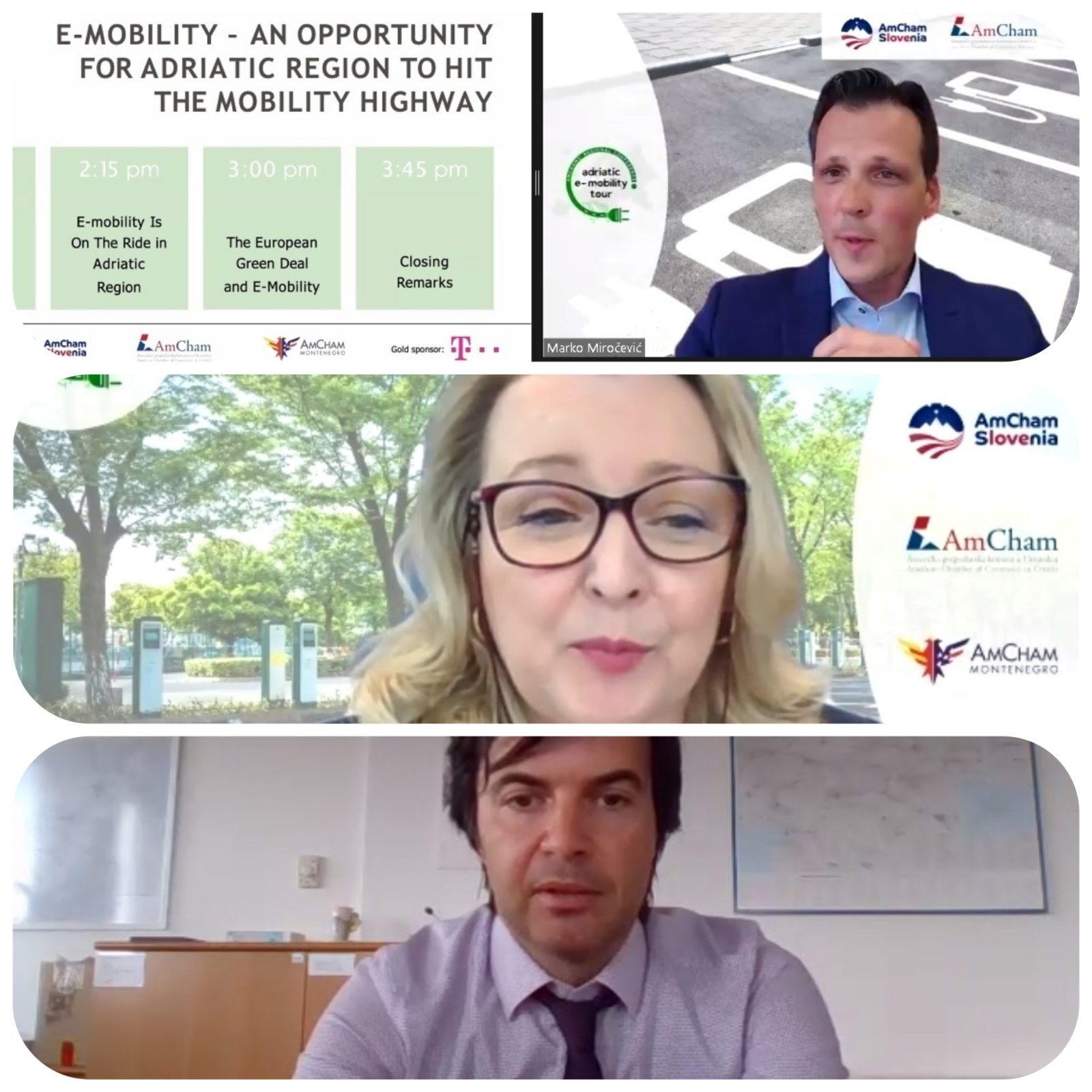
20
2021AmChams’ regional conference on e-mobility: Countries in the region must follow trends and the European Green Deal
Providing adequate transport infrastructure, transforming economic models and public policies for enviromental protection, as well as timely adoption of the European legislation, are imperatives for countries in Southeast Europe that want to participate in the process of implementation of European Commission Strategy for Sustainable and Smart Mobility, based on which it will be worked on green and digital transformation of transport system in the European Union, it was concluded, among other things, at today’s regional conference “Adriatic e-mobility tour”, organized by the AmCham from Montenegro, Croatia and Slovenia.
Representatives of private and state sector discussed how the Adriatic region can accept green and digital transport driven by e-mobility during the two panel sessions. At the first session dedicated to e-mobility of our region, participants were Mr. Dino Novosel, Global Executive E-Mobility Leader, Hrvatski Telekom (Croatia), Mr. Matej Čer, founder and owner, AvantCar (Slovenia) and on behalf of Montenegro, Mr. Ahmet Avci, Executive Director and Owner, Venn Tour (Tesla Taxi) (Montenegro). More about the European Green Deal and e-mobility we could hear from Mr. Darko Trajanov, Director General, Directorate for Sustainable Mobility and Transport Policy, Ministry of Infrastructure, Slovenia and Ms. Josipa Božinović, Senior expert advisor – specialist from Independent Sector for Foreign and European Affairs and Public Relations, Ministry of Sea, Transport and Infrastructure, Croatia.
The AmCham Executive Director, Marko Miročević, PhD, said during his opening remarks that he is pleased that the Chamber is showing the AmCham’s network strength by organizing such events, which aim to address issues that should bring us closer to the European and world standards and trends. A strong shift towards e-transport, which includes huge investment into charging stations, public transport, e-vehicle production and overall technology development, is an inevitable path for our region, said the AmCham Executive Director.
Mr. Ahmet Avci, Director and Owner, Venn Tour Tesla Taxi – Montenegro, pointed out during the panel session that the private sector is forced to follow these trends almost independently, which is an aggravating circumstance for business network and development and implies high expences. However, says that he hopes that some progress will be made in the future, as well as that they are already attracting attention in our country by being – different and modern.
Although already in the European Union, similar problems share our friends from the neighborhood. Speakers from Croatia and Slovenia expressed their impressions and views of the main obstacles for the region’s countries. It is certain that the pandemic of the new corona virus had shaken up world economies and disturbed plans, but this is, according to the participants, an opportunity for the new economic policies, based on the sustainable solutions, driven by modernization and digitalization. Two years ago, Republic of Poland has passed a law on e-mobility and identified obstacles that our region also recognizes, so in this context, it can be of a great help on the way in harmonizing activities with the European Green Deal.
Participants from Croatia say that 20 percent of electric cars by 2030 is a possible scenario for our countries. It is a mega trend and the only question is whether we as societies want to take an active part and give added value to the Europe. This is an opportunity for both growth and development, with great benefits for the economy and society.
The European Green Deal, a project with the aim of creating a climate-neutral Europe by 2050, envisions an action plan that will increase resource efficiency by switching to a circular economy, stop climate change, reduce air pollution and preserve biodiversity.
To translate these aspirations into legal obligations, the European Commission last year presented a proposal for a European climate law and adopted a European industrial strategy, in order to make mobility inclusive, smarter, greener, affordable for all, and rural and inaccessible regions connected, in order for the transport sector to provid good conditions for society and employment.








